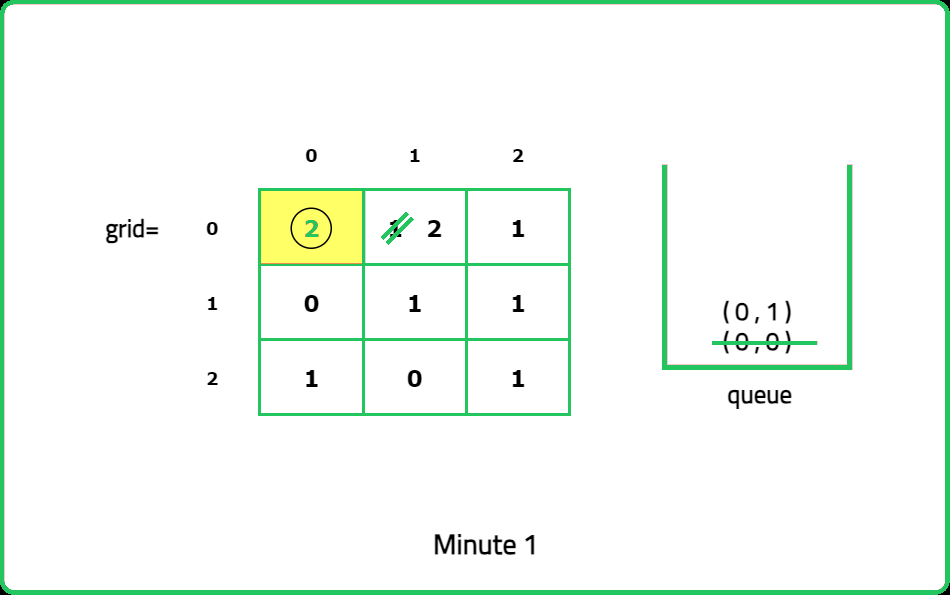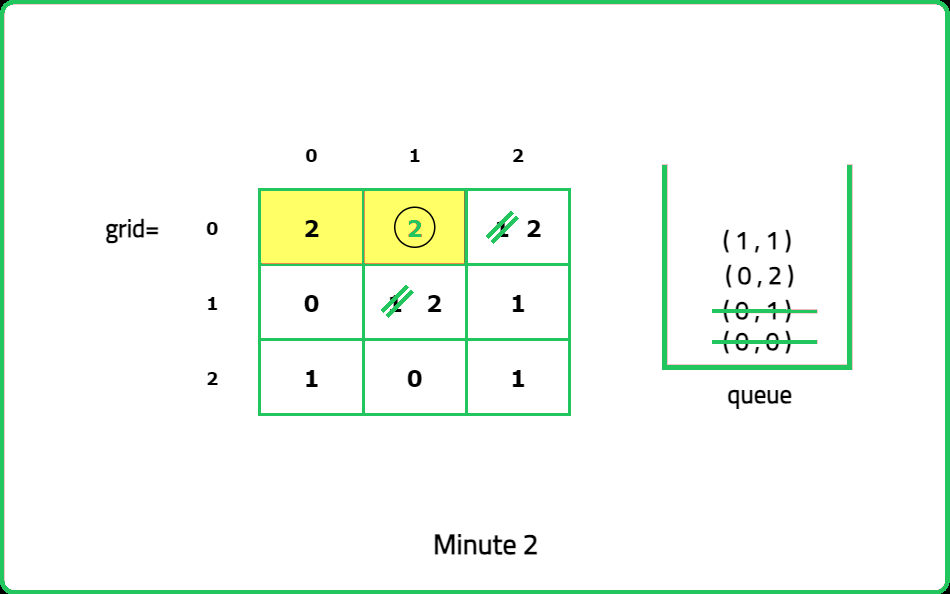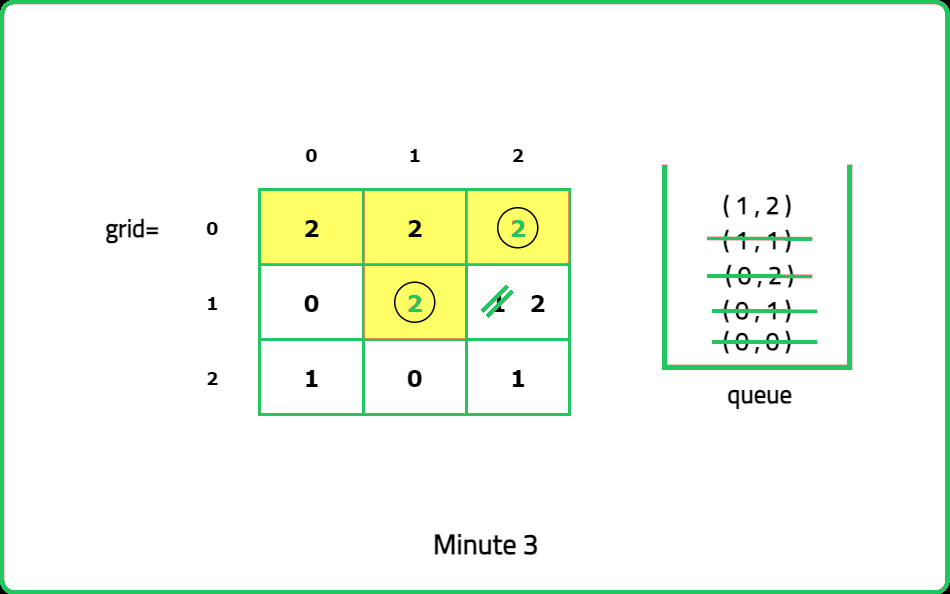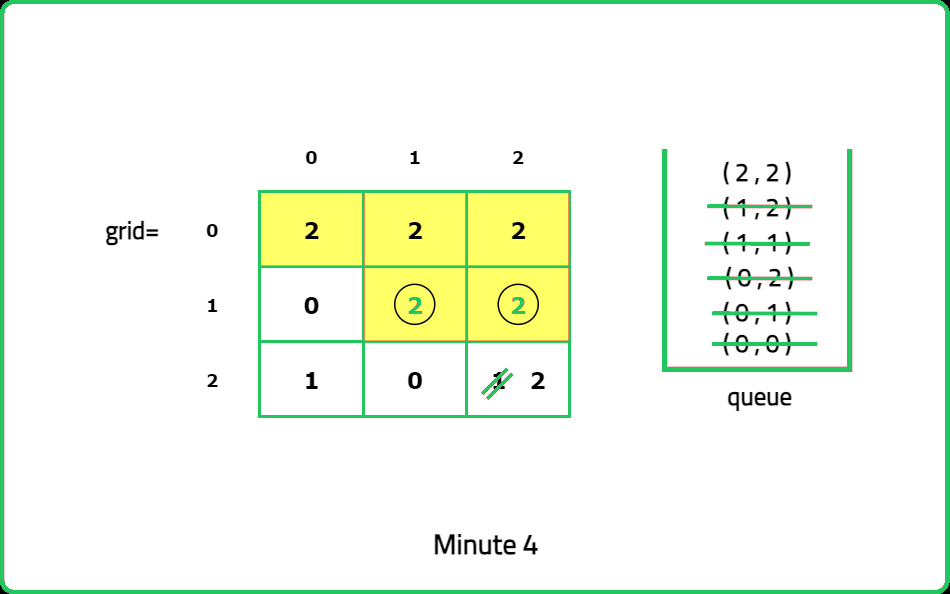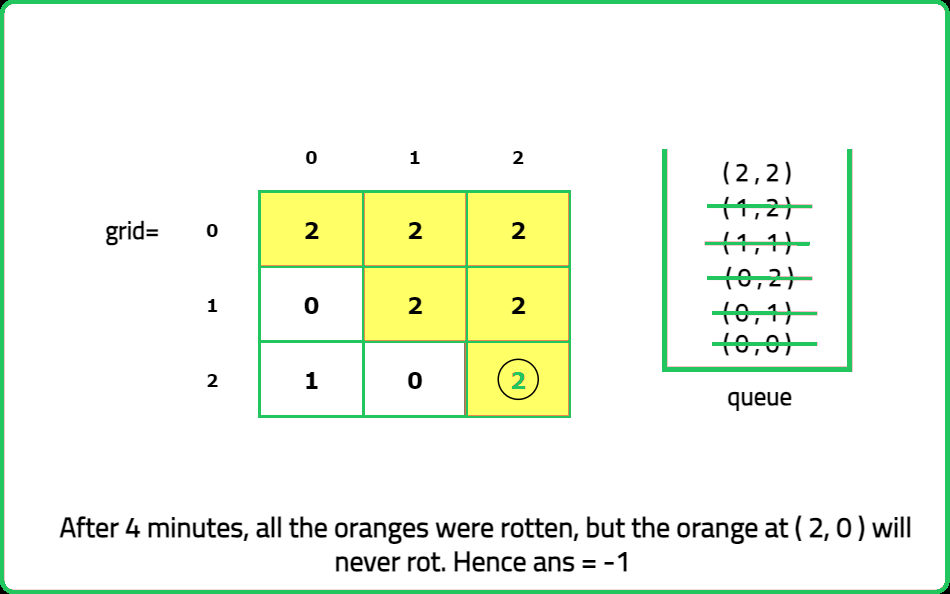123456789101112131415161718192021222324252627282930313233343536373839404142434445464748495051525354555657585960616263646566676869707172737475767778798081828384858687888990919293949596979899100101102103104105106107108109110111112113114115116117118119120121122123124125126127128129130131132133134135136
#include <bits/stdc++.h>
using namespace std;
class Solution {
private:
// DelRow and delCol for neighbors
vector<int> delRow = {-1, 0, 1, 0};
vector<int> delCol = {0, 1, 0, -1};
/* Helper Function to check if a
cell is within boundaries */
bool isValid(int &i, int &j,
int &n, int &m) {
// Return false if cell is invalid
if(i < 0 || i >= n) return false;
if(j < 0 || j >= m) return false;
// Return true if cell is valid
return true;
}
public:
/* Function to find number of minutes
so that all oranges get rotten */
int orangesRotting(vector<vector<int>> &grid){
// Get the dimensions of grid
int n = grid.size();
int m = grid[0].size();
/* Variable to store time taken
to get all oranges rotten */
int time = 0;
/* Variable to store
total count of oranges */
int total = 0;
/* Variable to store count of
oranges that are rotten */
int count = 0;
// Queue to perform BFS
queue<pair<int,int>> q;
// Traverse the grid
for(int i=0; i < n; i++) {
for(int j=0; j < m; j++) {
/* If cell contains orange,
increment total */
if(grid[i][j] != 0) total++;
/* If cell contains rotten
orange, push in queue */
if(grid[i][j] == 2) {
q.push({i, j});
}
}
}
// Perform BFS
// Until the queue is empty
while(!q.empty()) {
// Get the size of queue
int k = q.size();
// Update count of rotten oranges
count += k;
// Perform BFS for current level
while(k--) {
// Get the cell from queue
auto cell = q.front();
q.pop();
// Get its coordinates
int row = cell.first;
int col = cell.second;
// Traverse its 4 neighbors
for(int i=0; i < 4; i++) {
// Coordinates of new cell
int nRow = row + delRow[i];
int nCol = col + delCol[i];
/* check for valid, unvisited
cells having fresh oranges */
if(isValid(nRow, nCol, n, m) &&
grid[nRow][nCol] == 1) {
/* Mark the new orange as rotten
and add it to the queue */
grid[nRow][nCol] = 2;
q.push({nRow, nCol});
}
}
}
/* If new oranges are rotten, then
the time must be incremented */
if(!q.empty()) time++;
}
/* If all the oranges are rotten,
return the time taken */
if(total == count) return time;
// Otherwise return -1
return -1;
}
};
int main() {
vector<vector<int>> grid = {
{2, 1, 1},
{1, 1, 0},
{0, 1, 1}
};
/* Creating an instance of
Solution class */
Solution sol;
/* Function call to find number of minutes
so that all oranges get rotten */
int ans = sol.orangesRotting(grid);
cout << "The minimum number of minutes required for all oranges to rotten are: " << ans;
return 0;
}
123456789101112131415161718192021222324252627282930313233343536373839404142434445464748495051525354555657585960616263646566676869707172737475767778798081828384858687888990919293949596979899100101102103104105106107108109110111112113114115116117118119120121122123124125126127128129130131132
import java.util.*;
class Solution {
// DelRow and delCol for neighbors
private int[] delRow = {-1, 0, 1, 0};
private int[] delCol = {0, 1, 0, -1};
/* Helper Function to check if a
cell is within boundaries */
private boolean isValid(int i, int j,
int n, int m) {
// Return false if cell is invalid
if(i < 0 || i >= n) return false;
if(j < 0 || j >= m) return false;
// Return true if cell is valid
return true;
}
/* Function to find number of minutes
so that all oranges get rotten */
public int orangesRotting(int[][] grid){
// Get the dimensions of grid
int n = grid.length;
int m = grid[0].length;
/* Variable to store time taken
to get all oranges rotten */
int time = 0;
/* Variable to store
total count of oranges */
int total = 0;
/* Variable to store count of
oranges that are rotten */
int count = 0;
// Queue to perform BFS
Queue<int[]> q = new LinkedList<>();
// Traverse the grid
for(int i = 0; i < n; i++) {
for(int j = 0; j < m; j++) {
/* If cell contains orange,
increment total */
if(grid[i][j] != 0) total++;
/* If cell contains rotten
orange, push in queue */
if(grid[i][j] == 2) {
q.add(new int[]{i, j});
}
}
}
// Perform BFS
// Until the queue is empty
while(!q.isEmpty()) {
// Get the size of queue
int k = q.size();
// Update count of rotten oranges
count += k;
// Perform BFS for current level
while(k-- > 0) {
// Get the cell from queue
int[] cell = q.poll();
// Get its coordinates
int row = cell[0];
int col = cell[1];
// Traverse its 4 neighbors
for(int i = 0; i < 4; i++) {
// Coordinates of new cell
int nRow = row + delRow[i];
int nCol = col + delCol[i];
/* check for valid, unvisited
cells having fresh oranges */
if(isValid(nRow, nCol, n, m) &&
grid[nRow][nCol] == 1) {
/* Mark the new orange as rotten
and add it to the queue */
grid[nRow][nCol] = 2;
q.add(new int[]{nRow, nCol});
}
}
}
/* If new oranges are rotten, then
the time must be incremented */
if(!q.isEmpty()) time++;
}
/* If all the oranges are rotten,
return the time taken */
if(total == count) return time;
// Otherwise return -1
return -1;
}
public static void main(String[] args) {
int[][] grid = {
{2, 1, 1},
{1, 1, 0},
{0, 1, 1}
};
/* Creating an instance of
Solution class */
Solution sol = new Solution();
/* Function call to find number of minutes
so that all oranges get rotten */
int ans = sol.orangesRotting(grid);
System.out.println("The minimum number of minutes required for all oranges to rotten are: " + ans);
}
}
123456789101112131415161718192021222324252627282930313233343536373839404142434445464748495051525354555657585960616263646566676869707172737475767778798081828384858687888990919293949596979899100101102103104105106107108109110111112113114115116117118119
from collections import deque
class Solution:
# DelRow and delCol for neighbors
delRow = [-1, 0, 1, 0]
delCol = [0, 1, 0, -1]
# Helper Function to check if a
# cell is within boundaries
def isValid(self, i, j, n, m):
# Return false if cell is invalid
if i < 0 or i >= n:
return False
if j < 0 or j >= m:
return False
# Return true if cell is valid
return True
# Function to find number of minutes
# so that all oranges get rotten
def orangesRotting(self, grid):
# Get the dimensions of grid
n = len(grid)
m = len(grid[0])
# Variable to store time taken
# to get all oranges rotten
time = 0
# Variable to store
# total count of oranges
total = 0
# Variable to store count of
# oranges that are rotten
count = 0
# Queue to perform BFS
q = deque()
# Traverse the grid
for i in range(n):
for j in range(m):
# If cell contains orange,
# increment total
if grid[i][j] != 0:
total += 1
# If cell contains rotten
# orange, push in queue
if grid[i][j] == 2:
q.append((i, j))
# Perform BFS
# Until the queue is empty
while q:
# Get the size of queue
k = len(q)
# Update count of rotten oranges
count += k
# Perform BFS for current level
for _ in range(k):
# Get the cell from queue
row, col = q.popleft()
# Traverse its 4 neighbors
for i in range(4):
# Coordinates of new cell
nRow = row + self.delRow[i]
nCol = col + self.delCol[i]
# check for valid, unvisited
# cells having fresh oranges
if (self.isValid(nRow, nCol, n, m)
and grid[nRow][nCol] == 1):
# Mark the new orange as rotten
# and add it to the queue
grid[nRow][nCol] = 2
q.append((nRow, nCol))
# If new oranges are rotten, then
# the time must be incremented
if q:
time += 1
# If all the oranges are rotten,
# return the time taken
if total == count:
return time
# Otherwise return -1
return -1
# Main function to test the solution
if __name__ == "__main__":
grid = [
[2, 1, 1],
[1, 1, 0],
[0, 1, 1]
]
# Creating an instance of
# Solution class
sol = Solution()
# Function call to find number of minutes
# so that all oranges get rotten
ans = sol.orangesRotting(grid)
print("The minimum number of minutes required for all oranges to rotten are:", ans)
123456789101112131415161718192021222324252627282930313233343536373839404142434445464748495051525354555657585960616263646566676869707172737475767778798081828384858687888990919293949596979899100101102103104105106107108109110111112113114115116117118119120121122123124
class Solution {
constructor() {
// DelRow and delCol for neighbors
this.delRow = [-1, 0, 1, 0];
this.delCol = [0, 1, 0, -1];
}
/* Helper Function to check if a
cell is within boundaries */
isValid(i, j, n, m) {
// Return false if cell is invalid
if (i < 0 || i >= n) return false;
if (j < 0 || j >= m) return false;
// Return true if cell is valid
return true;
}
/* Function to find number of minutes
so that all oranges get rotten */
orangesRotting(grid) {
// Get the dimensions of grid
const n = grid.length;
const m = grid[0].length;
/* Variable to store time taken
to get all oranges rotten */
let time = 0;
/* Variable to store
total count of oranges */
let total = 0;
/* Variable to store count of
oranges that are rotten */
let count = 0;
// Queue to perform BFS
const q = [];
// Traverse the grid
for (let i = 0; i < n; i++) {
for (let j = 0; j < m; j++) {
/* If cell contains orange,
increment total */
if (grid[i][j] !== 0) total++;
/* If cell contains rotten
orange, push in queue */
if (grid[i][j] === 2) {
q.push([i, j]);
}
}
}
// Perform BFS
// Until the queue is empty
while (q.length > 0) {
// Get the size of queue
const k = q.length;
// Update count of rotten oranges
count += k;
// Perform BFS for current level
for (let i = 0; i < k; i++) {
// Get the cell from queue
const cell = q.shift();
// Get its coordinates
const row = cell[0];
const col = cell[1];
// Traverse its 4 neighbors
for (let i = 0; i < 4; i++) {
// Coordinates of new cell
const nRow = row + this.delRow[i];
const nCol = col + this.delCol[i];
/* check for valid, unvisited
cells having fresh oranges */
if (this.isValid(nRow, nCol, n, m) &&
grid[nRow][nCol] === 1) {
/* Mark the new orange as rotten
and add it to the queue */
grid[nRow][nCol] = 2;
q.push([nRow, nCol]);
}
}
}
/* If new oranges are rotten, then
the time must be incremented */
if (q.length > 0) time++;
}
/* If all the oranges are rotten,
return the time taken */
if (total === count) return time;
// Otherwise return -1
return -1;
}
}
// Main function to test the solution
const grid = [
[2, 1, 1],
[1, 1, 0],
[0, 1, 1]
];
/* Creating an instance of
Solution class */
const sol = new Solution();
/* Function call to find number of minutes
so that all oranges get rotten */
const ans = sol.orangesRotting(grid);
console.log("The minimum number of minutes required for all oranges to rotten are:", ans);
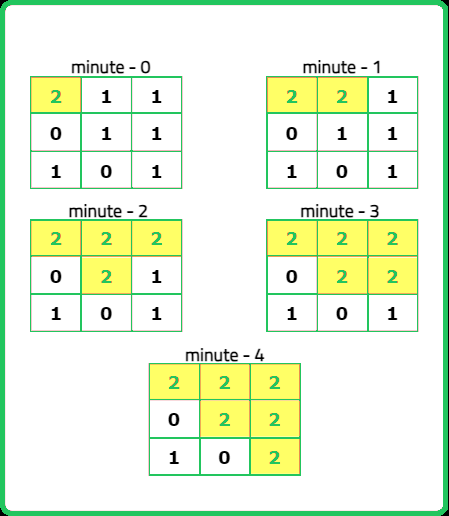
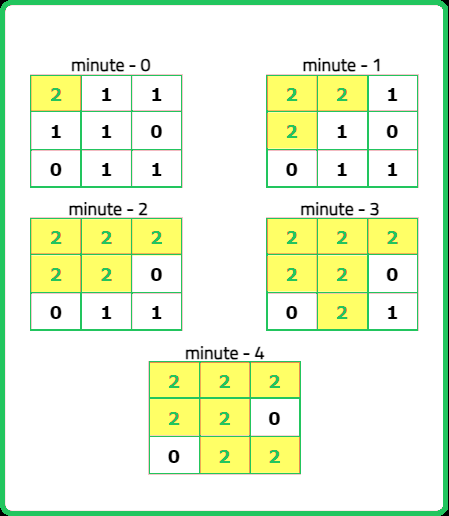
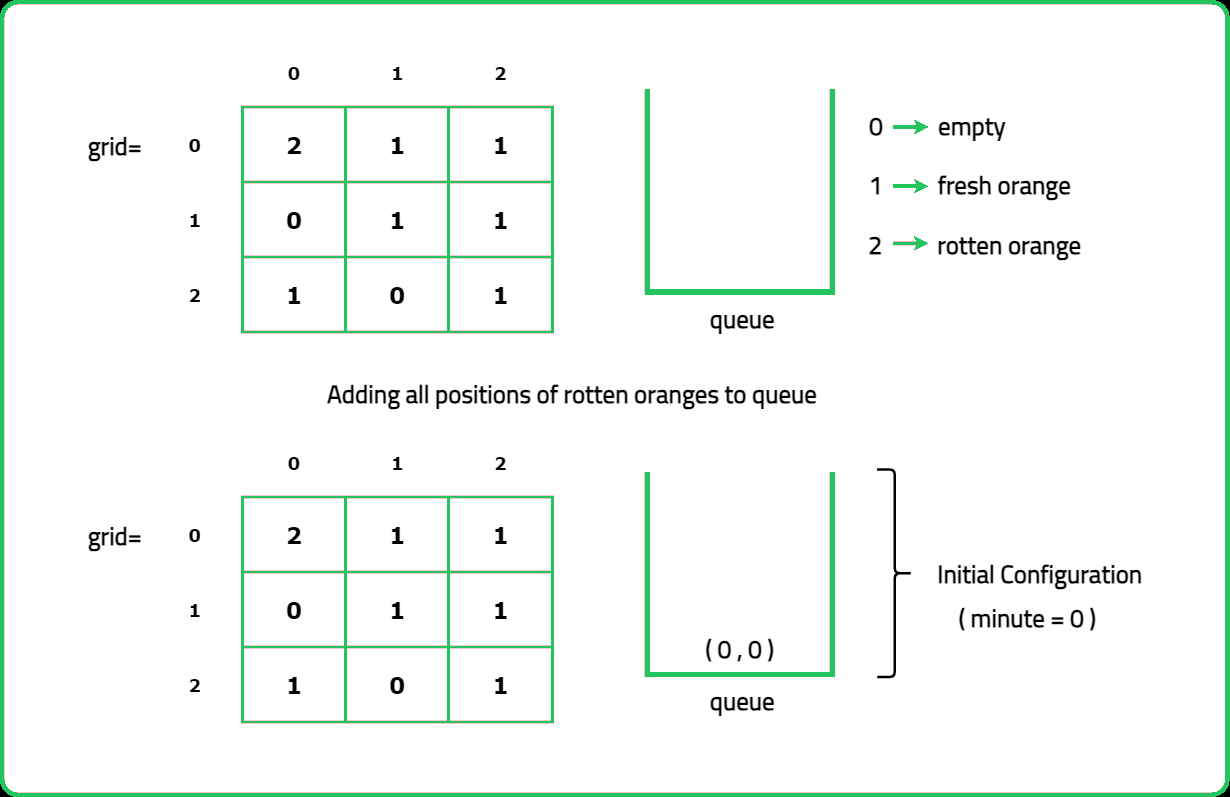 Dry Run
Dry Run
